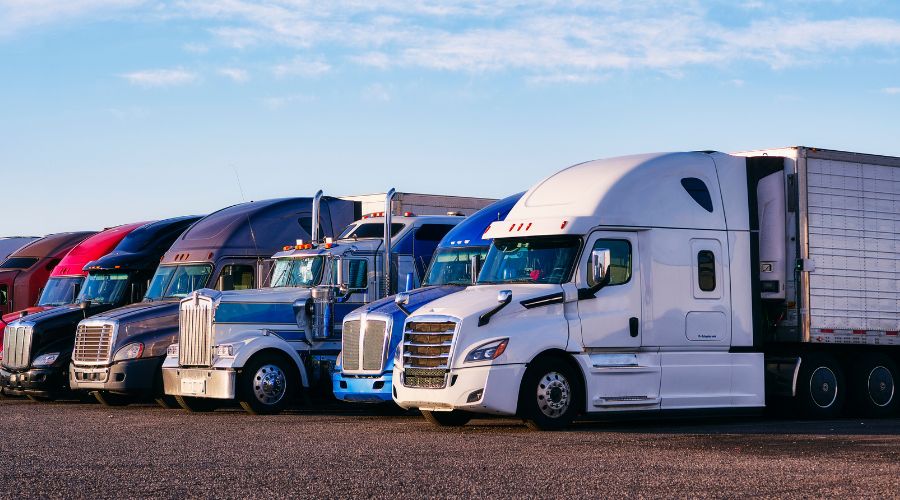
Freight Factoring: Complete Guide for Trucking Companies and Fleet Owners
Freight factoring has become a financial lifeline for trucking companies facing the trucking industry's most persistent challenge: waiting 30, 60, or even 90 days to get paid while covering immediate costs like fuel, driver wages, and maintenance. For carriers navigating today's competitive freight market, understanding how freight factoring works—and whether it's the right solution for your trucking business—can mean the difference between steady business growth and constant cash flow stress.
Key Takeaways
- Freight factoring converts outstanding invoices into immediate cash — typically within 24 hours — eliminating the 30-90-day payment wait that strains trucking operations.
- Factoring rates typically range from 1.5–4% of invoice value, with most carriers paying 2-3% depending on volume, customer creditworthiness, and service terms.
- Approval focuses on your customers' credit, not yours, making factoring accessible even for startups, owner operators, or carriers with credit challenges.
- Recourse vs. non recourse factoring determines who bears the risk if a customer doesn't pay—understanding this distinction is critical to choosing the right arrangement.
- Hidden fees can significantly increase costs—setup charges, transaction fees, minimum volume requirements, and cancellation fees should all be evaluated before signing.
{{CTA}}
What Is Freight Factoring?

In freight factoring, trucking businesses sell their invoices to a third-party company to receive instant payment instead of waiting for customers to pay. Instead of waiting weeks or months for brokers and shippers to get paid, carriers receive 80-95% of the invoice value within 24-48 hours of delivery confirmation.
After purchasing the invoice at a discount, the factoring company handles collection and payment follow-up. In non-recourse agreements, they assume payment risk if the broker defaults; in recourse agreements, you remain liable if the customer never pays. Once customers pay the full invoice amount, factoring companies release the remaining balance to the carrier, minus their flat factoring fee.
This straightforward process transforms accounts receivable—money you're owed but haven't received—into working capital you can use immediately to fuel trucks, pay drivers, cover maintenance, and keep your operation moving.
How Does It Work?
The freight factoring process follows a streamlined cycle that most carriers can complete in minutes per transaction:
Step 1: Deliver the Load: You complete a haul and obtain a signed bill of lading (BOL) or proof of delivery from the customer.
Step 2: Submit the Invoice: You send the invoice, BOL, and rate confirmation to your factoring company—typically through a mobile app or online portal.
Step 3: Verification: The factoring company verifies the delivery with your customer and confirms the invoice details are accurate. This usually takes a few hours.
Step 4: Receive Your Advance: Once verified, you’ll receive 80–95% of your invoice amount directly to your bank account or fuel card, often on the very same day.
Step 5: Customer Pays the Factoring Company: The factoring company manages collections and waits for your customer to pay the invoice under their normal terms (net 30, net 60, etc.).
Step 6: Receive Your Reserve: After the customer pays, the factoring company releases the remaining balance to you, minus their factoring fee and any additional charges.
Unlike traditional business financing, there's no debt created and no fixed monthly payments—you only pay fees on the freight invoices you choose to factor.
What Are the Benefits of Freight Factoring?
Immediate Cash Flow
The primary advantage is speed. Freight factoring eliminates the 30-90 day wait between delivery and payment, converting completed work into usable capital within hours. This allows you to:
- Pay for fuel for the next load without tapping reserves
- Meet payroll obligations on schedule
- Handle unexpected repairs or maintenance
- Take on more loads without cash flow constraints
Accessible Approval
Unlike bank loans that scrutinize your credit history, factoring companies primarily evaluate your customers' creditworthiness. This means the factoring solution remains accessible to:
- Startup carriers with limited business history
- Owner-operators rebuilding after financial challenges
- Growing fleets that haven't established traditional credit
- Seasonal operations with variable revenue patterns
Administrative Support
Beyond funding, many factoring companies provide valuable back-office services included in their fee:
- Credit checks on new brokers and shippers
- Invoice generation and submission
- Collections management and follow-up
- Detailed expense reporting for tax preparation
For small operations without a dedicated team, these services often justify factoring costs even when alternative financing is available.
Flexible and Scalable
Factoring grows with your business. Factor $10,000 one week and $50,000 the next—you only pay for what you use. There's no borrowing limit based on your company's size or credit history, just practical limits based on your invoice volume.
What Are the Drawbacks or Risks of Freight Factoring?

Cost Can Be Higher Than Traditional Financing
Factoring fees of 2-5% per invoice translate into effective annual rates that can exceed traditional loan interest rates, especially if you're factoring invoices with 30-day terms throughout the year. A carrier paying 3% to factor $50,000 monthly spends $18,000 annually—potentially more than a business line of credit would cost.
Customer Notification
Factoring requires notifying your customers that they should pay the factoring company, not you. While this has become standard in the transportation industry—most brokers work with factored carriers daily—some carriers worry about perceptions of financial instability.
Potential Hidden Fees
Beyond the base factoring rate, additional costs can accumulate:
- Setup fees: $0-$500 for account initialization
- ACH transfer fees: $5-$15 per transaction
- Wire transfer fees: $20-$50 for same-day funding
- Monthly maintenance fees: $25-$100 regardless of volume
- Per-invoice processing fees: $2-$5 per invoice
- Early termination penalties: $500-$5,000+ if you exit early
Recourse Obligations
With recourse factoring (the most common type), you remain liable if a customer doesn't pay. If payment isn’t received within 90–120 days due to broker default or bankruptcy, the factoring company may require you to reimburse the advance or repurchase the invoice.
What Are the Different Types of Freight Factoring?
Recourse Factoring
Under recourse factoring agreements, you retain responsibility if customers don't pay within the agreed timeframe (typically 90-120 days). If a broker defaults, you must:
- Repurchase the unpaid invoice, or
- Substitute another invoice of equal value, or
- Have the amount deducted from your reserve account
Pros:
- Lower fees (typically 1-3%)
- Easier approval
- More provider options
Cons:
- You bear the collection risk
- Unexpected chargebacks can disrupt cash flow
- You remain liable for customer bankruptcy or non-payment
Best for carriers working with established, creditworthy brokers where payment risk is minimal.
Non Recourse Factoring
With non recourse factoring, the factoring company assumes complete responsibility if a customer doesn't pay due to insolvency or bankruptcy. You receive your advance and keep it regardless of whether the customer ever pays.
Pros:
- Complete protection from customer non-payment
- No chargeback risk to disrupt operations
- Predictable, stable costs
Cons:
- Higher fees (typically 3-5%+)
- More restrictive approval (factoring companies are pickier about which brokers qualify)
- May include exclusions for commercial disputes or documentation errors
Best for owner operators with tight margins, carriers working spot freight with unknown brokers, or operations unable to absorb unexpected losses.
Spot Factoring
Spot factoring lets you factor individual invoices rather than committing all invoices to factoring. This flexibility lets you:
- Factor only urgent invoices when cash is tight
- Avoid fees when customers pay quickly
- Test factoring before committing long-term
However, spot factoring typically comes with higher per-invoice rates (4-6%) and doesn't offer volume discounts.
{{CTA}}
How Much Does Freight Factoring Cost?
What Determines Your Rate?
Several factors influence the factoring rate you'll receive:
- Monthly volume: Factoring $100,000+ monthly can secure rates as low as 1.5-2%
- Customer creditworthiness: Working with Fortune 500 shippers gets better rates than unknown brokers
- Invoice terms: Net-30 invoices cost less than net-90
- Recourse vs. non recourse: Non recourse adds 0.5-1.5% to rates
- Contract length: Annual contracts may offer lower rates than month-to-month
How Does Freight Factoring Compare to Other Financing Options?
Choose factoring when:
- You need cash immediately (within 24 hours)
- Your credit isn't strong enough for traditional financing
- You want to avoid debt on your balance sheet
- Your capital needs fluctuate month-to-month
Choose traditional financing when:
- You have strong credit and can wait weeks for approval
- You need large lump sums for equipment or expansion
- You want the lowest possible financing costs
- You can handle fixed monthly payments regardless of revenue
Many successful carriers use both factoring for day-to-day working capital and traditional loans for major equipment purchases. Modern payment solutions like AtoB can complement factoring by providing instant fuel payment with universal acceptance and built-in expense management tools.
How Can You Apply for Freight Factoring?
Most factoring companies offer streamlined application processes:
- Research providers – Compare rates, fee structures, and customer reviews from multiple factoring companies.
- Complete online application – Provide basic business information, operating authority (MC/DOT numbers), and estimated monthly invoice volume.
- Submit documentation – Most require:
- Articles of incorporation or business formation documents
- Recent invoices or rate confirmations showing customer relationships
- Schedule of accounts (list of customers you work with)
- W-9 form
- Customer credit checks – The factoring company verifies the creditworthiness of your brokers and shippers.
- Contract review – Carefully review all terms, especially advance rates, fee schedules, minimum volume requirements, and termination provisions..
- Account setup – Once approved, you'll receive cards or account access and can start submitting invoices immediately.
On average, the process takes about 3–7 business days to finalize. Some providers offer same-day approval for carriers with established broker relationships.
How Do You Choose the Right Freight Factoring Company?

Prioritize Transparent Pricing
Look for providers that:
- Clearly disclose all fees upfront in writing
- Offer month-to-month contracts with no long-term commitments
- Explain their advance rate and reserve policies explicitly
- Provide sample calculations showing the total cost
Red flags: Vague "custom pricing," high-pressure sales tactics, reluctance to provide written fee schedules, or advertised rates "as low as" without clear qualification criteria.
Evaluate True Costs
Don't just compare headline rates. Request itemized fee schedules and calculate your total effective rate based on your actual transaction patterns. A company advertising 2% with $450 in monthly fees may cost more than a competitor at 3% with zero additional fees.
Check Network and Services
Ask about:
- Advance rate: 90-95% is ideal; 80-85% significantly impacts cash flow
- Funding speed: Same day or 24-hour funding?
- Included services: Credit checks, reporting, collections support?
- Technology: Mobile app for invoice submission? Real-time reporting dashboard?
- Customer support: Are account managers available during business hours and evenings?
Understand Contract Terms
Critical details to review:
- Contract length: Month-to-month is the most flexible
- Minimum volume requirements: Penalties if you don't meet monthly minimums?
- Early termination fees: What does it cost to switch providers?
- Notification period: How much notice is required to exit the agreement?
- Recourse terms: Exactly what happens if a customer doesn't pay?
Consider Industry Specialization
Factoring companies specializing in the trucking industry understand nuances such as IFTA reporting, fuel card integration, and broker credit evaluation. They're more likely to offer tailored factoring solutions and reasonable terms compared to general-purpose factoring firms.
Also read: Best Prepaid Fuel Cards
FAQs
Is freight factoring worth it?
Freight factoring is worth it when immediate cash flow access justifies the cost—typically 2-5% of invoice value. For carriers unable to wait 30-90 days for payment, managing tight margins, or lacking access to traditional financing, factoring provides essential working capital that keeps operations running smoothly. Calculate your true effective cost and compare it against the value of having money available immediately versus waiting weeks or months.
What are the rates for freight factoring?
Freight factoring rates typically range from 1% to 5% of invoice value, with most carriers paying 2% to 3%. Exact rates depend on your monthly volume (higher volume = lower rates), your customers' creditworthiness (better customers = lower rates), invoice payment terms (shorter terms = lower rates), and whether you choose recourse or non-recourse factoring. Volume discounts can significantly reduce rates; carriers factoring $100,000+ monthly often secure rates below 2%.
What type of freight is most profitable?
The most profitable freight types vary by market conditions, but specialized freight typically offers higher margins:
- Hazmat loads require special certifications and carry premium rates
- Oversized/heavy haul commands higher rates due to specialized equipment and permits
- Refrigerated freight pays more than dry van due to equipment costs and perishable cargo responsibility
- Dedicated contract freight with consistent lanes provides stable, predictable revenue even if per-mile rates are moderate.
However, profitability depends on your specific operation, equipment, and relationships. The "best" freight is often what matches your equipment capabilities while providing consistent volume from reliable, prompt-paying customers.
Start Factoring Your Freight Bills Today
Freight factoring offers trucking companies a practical solution to the industry's most persistent challenge: getting paid fast enough to keep operations running smoothly. Through invoice factoring, companies gain quick access to cash, avoiding the extended payment cycles that can challenge even the most organized operations.
Whether a factoring solution is right for your operation depends on your specific situation—your cash flow needs, customer relationships, credit profile, and growth plans. For many carriers, particularly owner operators and small fleets, factoring provides essential working capital access that traditional financing can't match.
Beyond factoring, modern payment solutions can further optimize your cash flow and expense management. AtoB's fuel card platform, a financial technology company that provides innovative solutions for the trucking industry, delivers universal acceptance at fuel stations nationwide, with fuel discounts, instant expense tracking, and flexible spending controls. These tools complement factoring by helping you manage the other side of the equation: controlling costs and tracking expenses efficiently.
Whether you leverage factoring, traditional credit lines, or a combined financing strategy, understanding the true cost of capital and selecting the right partners ensures financial flexibility. With expert support and sound planning, you can focus on driving efficiency, expanding operations, and achieving long-term profitability.
Ready to explore better payment and expense management solutions for your fleet? Get started with AtoB today and discover how modern financial tools can help you reduce costs, improve cash flow visibility, and keep your operation moving forward.
{{CTA}}
Citations
[1] https://www.fmcsa.dot.gov/
[2] https://truckingresearch.org/
[3] https://www.transportation.gov/
[4] https://www.sba.gov/
[5] https://www.federalreserve.gov/
Get started with AtoB



.jpg)
